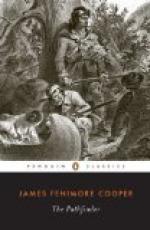“Nay, I did not say that much, though I believe I did save his scalp. A man might live without a scalp, and so I cannot say I saved his life. Jasper may say that much consarning you; for without his eye and arm the canoe would never have passed the rift in safety on a night like the last. The gifts of the lad are for the water, while mine are for the hunt and the trail. He is yonder, in the cove there, looking after the canoes, and keeping his eye on his beloved little craft. To my eye, there is no likelier youth in these parts than Jasper Western.”
For the first time since she had left her room, Mabel now turned her eyes beneath her, and got a view of what might be called the foreground of the remarkable picture she had been studying with so much pleasure. The Oswego threw its dark waters into the lake, between banks of some height; that on its eastern side being bolder and projecting farther north than that on its western. The fort was on the latter, and immediately beneath it were a few huts of logs, which, as they could not interfere with the defence of the place, had been erected along the strand for the purpose of receiving and containing such stores as were landed, or were intended to be embarked, in the communications between the different ports on the shores of Ontario. Two low, curved, gravelly points had been formed with surprising regularity by the counteracting forces of the northerly winds and the swift current, and, inclining from the storms of the lake, formed two coves within the river: that on the western side was the most deeply indented; and, as it also had the most water, it formed a sort of picturesque little port for the post. It was along the narrow strand that lay between the low height of the fort and the water of this cove, that the rude buildings just mentioned had been erected.
Several skiffs, bateaux, and canoes were hauled up on the shore, and in the cove itself lay the little craft from which Jasper obtained his claim to be considered a sailor. She was cutter-rigged, might have been of forty tons burthen, was so neatly constructed and painted as to have something of the air of a vessel of war, though entirely without quarters, and rigged and sparred with so scrupulous a regard to proportions and beauty, as well as fitness and judgment, as to give her an appearance that even Mabel at once distinguished to be gallant and trim. Her mould was admirable, for a wright of great skill had sent her drafts from England, at the express request of the officer who had caused her to be constructed; her paint dark, warlike, and neat; and the long coach-whip pennant that she wore at once proclaimed her to be the property of the king. Her name was the Scud.
“That, then, is the vessel of Jasper!” said Mabel, who associated the master of the little craft very naturally with the cutter itself. “Are there many others on this lake?”
“The Frenchers have three: one of which, they tell me, is a real ship, such as are used on the ocean; another a brig; and a third is a cutter, like the Scud here, which they call the Squirrel, in their own tongue, however; and which seems to have a natural hatred of our own pretty boat, for Jasper seldom goes out that the Squirrel is not at his heels.”




